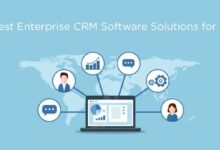Top Cloud-Based CRM Platforms: 7 Ultimate Power Tools for 2024
In today’s fast-paced digital world, the right CRM can make or break your customer relationships. Discover the top cloud-based CRM platforms that are revolutionizing sales, marketing, and service in 2024.
Why Cloud-Based CRM Platforms Are Essential in 2024

The shift from traditional, on-premise systems to cloud-based CRM platforms has been nothing short of transformative. These platforms offer unparalleled flexibility, scalability, and real-time access to customer data, making them indispensable for modern businesses. Whether you’re a startup or a multinational corporation, leveraging a cloud-based CRM can streamline operations, improve customer satisfaction, and boost revenue.
Scalability and Flexibility for Growing Businesses
One of the most compelling reasons to adopt a cloud-based CRM is its ability to scale with your business. Unlike legacy systems that require expensive hardware upgrades, cloud CRMs allow you to add users, features, and storage with just a few clicks.
- Pay-as-you-go pricing models reduce upfront costs.
- Automatic updates ensure you always have the latest features.
- Global access enables remote teams to collaborate seamlessly.
“The cloud has democratized access to enterprise-grade tools, allowing even small businesses to compete on a global scale.” — Forbes Technology Council
Real-Time Data Access and Collaboration
With cloud-based CRM platforms, sales teams can access customer information from any device, anywhere in the world. This real-time access ensures that no opportunity is missed and that customer interactions are always informed and timely.
- Sales reps can update deal stages instantly from the field.
- Customer service agents can view complete interaction histories.
- Marketing teams can launch campaigns based on live behavioral data.
Top Cloud-Based CRM Platforms: A Comprehensive Overview
With dozens of options on the market, choosing the right CRM can be overwhelming. To help you make an informed decision, we’ve analyzed the top cloud-based CRM platforms based on features, usability, integration capabilities, pricing, and customer support. These platforms stand out as leaders in innovation and performance.
Criteria for Evaluating Top Cloud-Based CRM Platforms
Before diving into individual platforms, it’s important to understand the key criteria used to evaluate them. These benchmarks ensure that the platforms listed are not only feature-rich but also practical for real-world business needs.
- User Interface and Ease of Use: A clean, intuitive interface reduces training time and increases adoption.
- Integration Capabilities: The ability to connect with email, calendar, marketing automation, and ERP systems is crucial.
- Customization and Automation: Businesses need tools that adapt to their workflows, not the other way around.
- Security and Compliance: Data protection standards like GDPR, HIPAA, and SOC 2 are non-negotiable.
- Customer Support and Training: Responsive support and comprehensive onboarding resources are vital for long-term success.
Market Trends Shaping the Top Cloud-Based CRM Platforms
The CRM landscape is evolving rapidly, driven by artificial intelligence, mobile-first design, and deeper analytics. The top cloud-based CRM platforms are now incorporating AI-driven insights, predictive lead scoring, and voice-enabled interfaces to stay ahead.
Top Cloud-Based CRM Platforms – Top Cloud-Based CRM Platforms menjadi aspek penting yang dibahas di sini.
- AI-powered chatbots are enhancing customer service efficiency.
- Predictive analytics help sales teams prioritize high-value leads.
- Mobile CRM apps now support offline mode and voice commands.
According to a Gartner report, the global CRM market is projected to exceed $120 billion by 2025, with cloud-based solutions accounting for over 85% of new deployments.
Salesforce: The Undisputed Leader Among Top Cloud-Based CRM Platforms
Salesforce continues to dominate the CRM space, consistently ranking as the #1 platform for enterprises and mid-sized businesses alike. Its robust ecosystem, extensive customization options, and powerful AI engine (Einstein) make it a top choice for organizations seeking a comprehensive solution.
Key Features That Make Salesforce a Top Cloud-Based CRM Platform
Salesforce offers a suite of tools designed to manage every aspect of the customer lifecycle. From lead generation to post-sale support, its platform is built for scalability and deep integration.
- Sales Cloud: Tracks leads, opportunities, and forecasts with precision.
- Service Cloud: Powers customer service with omnichannel support and AI chatbots.
- Marketing Cloud: Enables personalized email, social, and ad campaigns.
- Community Cloud: Builds branded customer and partner portals.
- Einstein AI: Provides predictive analytics, automated insights, and smart recommendations.
Pros and Cons of Salesforce as a Top Cloud-Based CRM Platform
While Salesforce is powerful, it’s not without its challenges. Understanding both sides helps businesses make informed decisions.
- Pros:
- Extensive app marketplace (AppExchange) with over 3,000 integrations.
- Highly customizable with drag-and-drop workflow builders.
- Strong security and compliance certifications.
- Global data centers ensure high availability and low latency.
- Cons:
- Steeper learning curve for new users.
- Pricing can become expensive with add-ons.
- Requires dedicated admin for optimal configuration.
For more details, visit the official Salesforce Sales Cloud page.
HubSpot CRM: Best All-in-One Platform for SMBs
HubSpot CRM has emerged as a favorite among small and medium-sized businesses due to its user-friendly interface, free tier, and seamless integration with marketing and sales tools. It’s not just a CRM—it’s a complete growth platform.
Why HubSpot Stands Out Among Top Cloud-Based CRM Platforms
HubSpot’s philosophy is centered around inbound marketing and customer-centric growth. This makes it ideal for businesses that prioritize content, SEO, and relationship-building over aggressive sales tactics.
Top Cloud-Based CRM Platforms – Top Cloud-Based CRM Platforms menjadi aspek penting yang dibahas di sini.
- Free CRM with no user limits.
- Intuitive dashboard with deal pipelines, contact timelines, and task management.
- Native email tracking, meeting scheduling, and live chat.
- Seamless integration with HubSpot’s marketing, sales, and service hubs.
HubSpot’s Free vs. Paid Tiers in the Top Cloud-Based CRM Platforms Landscape
One of HubSpot’s biggest advantages is its generous free plan, which includes core CRM features. However, as businesses grow, they may need to upgrade to access advanced functionality.
- Free Plan: Contact & deal management, email tracking, live chat, basic reporting.
- Starter ($50/month): Adds email automation, forms, and simple workflows.
- Professional ($1,400/month): Includes advanced automation, A/B testing, and custom reporting.
- Enterprise ($3,200/month): Offers predictive lead scoring, territory management, and advanced permissions.
Despite the high cost of enterprise plans, many users find the ROI justifies the investment. Learn more at HubSpot CRM Overview.
Microsoft Dynamics 365: Enterprise-Grade Power for Complex Workflows
For organizations already embedded in the Microsoft ecosystem, Dynamics 365 offers a seamless, powerful CRM experience. It integrates effortlessly with Office 365, Teams, and Azure, making it a top choice for enterprises with complex operational needs.
Integration with Microsoft Ecosystem: A Key Advantage
Dynamics 365 shines when used alongside Microsoft products. Sales teams can work directly from Outlook, service agents can collaborate in Teams, and data analysts can pull insights using Power BI.
- Email, calendar, and task sync with Outlook.
- Real-time collaboration in Microsoft Teams.
- Advanced analytics with Power BI dashboards.
- Secure cloud infrastructure via Microsoft Azure.
Dynamics 365 Modules and Pricing Structure
Unlike monolithic CRMs, Dynamics 365 is modular—businesses can purchase only the components they need.
- Sales: $65/user/month – Lead & opportunity management.
- Customer Service: $95/user/month – Case management, knowledge base, SLAs.
- Marketing: $2,000/month (up to 10K contacts) – Campaign management, event tracking.
- Field Service: $95/user/month – Scheduling, dispatch, IoT integration.
This flexibility makes it cost-effective for departments with specific needs. Explore more at Microsoft Dynamics 365.
Zoho CRM: The Budget-Friendly Powerhouse
Zoho CRM has gained a loyal following for offering enterprise-level features at a fraction of the cost. It’s particularly popular among startups, SMBs, and nonprofits looking for a robust yet affordable solution.
Top Cloud-Based CRM Platforms – Top Cloud-Based CRM Platforms menjadi aspek penting yang dibahas di sini.
AI and Automation Features in Zoho CRM
Zia, Zoho’s AI assistant, brings smart automation to everyday tasks. From predicting deal closures to suggesting next steps, Zia enhances productivity across sales and service teams.
- AI-powered lead scoring and sentiment analysis.
- Voice-based data entry and meeting summaries.
- Automated follow-ups and task reminders.
- Forecasting accuracy improved by up to 40%.
Zoho CRM’s Pricing and Scalability
Zoho CRM’s pricing is among the most competitive in the market, making it a top contender among top cloud-based CRM platforms for budget-conscious organizations.
- Free Plan: Up to 3 users, basic CRM features.
- Standard ($14/user/month): Email integration, web forms, workflow automation.
- Professional ($23/user/month): Custom functions, advanced automation, territory management.
- Enterprise ($40/user/month): Multi-currency, audit trails, custom modules.
Additionally, Zoho offers a Zoho One bundle for $37/user/month, which includes 40+ business apps—making it one of the most comprehensive suites available.
Pipedrive: Sales-Focused Simplicity at Its Best
Pipedrive is designed for sales teams that want a visual, pipeline-driven approach to CRM. Its drag-and-drop interface makes it easy to track deals, forecast revenue, and identify bottlenecks in the sales process.
Visual Pipeline Management and Sales Automation
The core of Pipedrive is its intuitive sales pipeline. Each deal moves through customizable stages, giving managers real-time visibility into performance.
- Drag-and-drop deal movement across stages.
- Automated reminders for follow-ups and overdue tasks.
- Activity timelines and email integration.
- Revenue forecasting with scenario modeling.
Why Pipedrive Excels Among Top Cloud-Based CRM Platforms for Sales Teams
Pipedrive’s focus on sales efficiency makes it ideal for organizations where closing deals is the primary goal. It minimizes administrative overhead and maximizes time spent selling.
- Mobile app supports offline mode and voice notes.
- Integrates with over 400 tools via Zapier and native connectors.
- Customizable reports and dashboards for KPIs.
- Two-way sync with Gmail, Outlook, and calendars.
For sales leaders, Pipedire’s sales pipeline software offers unmatched clarity and control.
Top Cloud-Based CRM Platforms – Top Cloud-Based CRM Platforms menjadi aspek penting yang dibahas di sini.
Oracle CX Sales: Deep Analytics and AI for Enterprise Sales
Oracle’s CX Sales platform is built for large enterprises with complex sales cycles and global operations. It combines deep data analytics, AI-driven insights, and robust integration with ERP systems to deliver a comprehensive CRM solution.
Advanced Forecasting and Territory Management
Oracle CX Sales excels in helping large sales organizations plan, execute, and measure performance across regions and teams.
- AI-powered forecasting with confidence scoring.
- Dynamic territory management based on performance and market data.
- Quota setting and compensation planning tools.
- Real-time dashboards for executive oversight.
Integration with Oracle ERP and Supply Chain
For companies using Oracle’s broader business suite, CX Sales offers seamless integration with financials, inventory, and supply chain data—enabling end-to-end visibility from lead to delivery.
- Sales orders sync directly with ERP systems.
- Inventory availability checks during quoting.
- Automated invoicing and revenue recognition.
- Compliance tracking for regulated industries.
Learn more at Oracle CX Sales.
Key Factors to Consider When Choosing Top Cloud-Based CRM Platforms
Selecting the right CRM isn’t just about features—it’s about alignment with your business goals, team size, industry, and budget. Here are the most critical factors to evaluate before making a decision.
Industry-Specific Needs and Customization
Different industries have unique CRM requirements. For example, healthcare needs HIPAA compliance, while real estate benefits from property management integrations.
- Manufacturing: Needs integration with production and inventory systems.
- Retail: Requires POS and e-commerce platform sync.
- Professional Services: Benefits from time tracking and project billing.
- Nonprofits: Often need donor management and grant tracking.
Mobile Accessibility and Offline Functionality
With remote work on the rise, mobile CRM access is no longer optional. The best top cloud-based CRM platforms offer robust mobile apps with offline capabilities.
Top Cloud-Based CRM Platforms – Top Cloud-Based CRM Platforms menjadi aspek penting yang dibahas di sini.
- Offline data entry and syncing when reconnected.
- GPS-based visit tracking for field sales.
- Voice-to-text for quick note-taking.
- Push notifications for deal updates and tasks.
Security, Compliance, and Data Privacy
As data breaches become more common, security is a top priority. Ensure your CRM provider adheres to industry standards.
- End-to-end encryption for data in transit and at rest.
- Regular third-party audits (SOC 2, ISO 27001).
- GDPR, CCPA, and HIPAA compliance where applicable.
- Role-based access controls and audit logs.
Future Trends in Top Cloud-Based CRM Platforms
The CRM industry is not standing still. Emerging technologies like generative AI, blockchain, and IoT are set to reshape how businesses manage customer relationships in the coming years.
AI and Generative AI Integration
Future CRM platforms will leverage generative AI to draft emails, summarize calls, and even suggest negotiation strategies based on historical data.
- Automated email and proposal generation.
- Real-time call coaching during customer conversations.
- AI-generated customer personas and segmentation.
- Predictive churn modeling with intervention suggestions.
IoT and Real-Time Customer Insights
As more devices become connected, CRMs will ingest real-time data from sensors and wearables to anticipate customer needs.
- Predictive maintenance alerts sent to service teams.
- Usage-based upselling opportunities.
- Integration with smart home and industrial IoT platforms.
Blockchain for Secure Customer Identity Management
Blockchain technology could enable decentralized customer identity verification, reducing fraud and improving consent management in CRM systems.
- Immutable audit trails for customer interactions.
- Self-sovereign identity for customers.
- Transparent consent tracking across touchpoints.
What is the best cloud-based CRM for small businesses?
HubSpot CRM and Zoho CRM are widely regarded as the best options for small businesses due to their free tiers, ease of use, and strong feature sets. HubSpot excels in marketing integration, while Zoho offers deeper customization at a lower cost.
Top Cloud-Based CRM Platforms – Top Cloud-Based CRM Platforms menjadi aspek penting yang dibahas di sini.
Which CRM platform is best for sales teams?
Pipedrive is specifically designed for sales teams with its visual pipeline and automation tools. Salesforce and Oracle CX Sales are also excellent for complex sales environments with large teams.
Is Salesforce worth the cost?
For mid-sized to large enterprises, Salesforce is often worth the investment due to its scalability, extensive ecosystem, and AI capabilities. However, smaller teams may find it overly complex and expensive without proper administration.
Can cloud-based CRM platforms work offline?
Yes, many top cloud-based CRM platforms, including Salesforce, HubSpot, and Pipedrive, offer mobile apps with offline functionality. Data syncs automatically once the device reconnects to the internet.
How do I migrate data to a new CRM?
Top Cloud-Based CRM Platforms – Top Cloud-Based CRM Platforms menjadi aspek penting yang dibahas di sini.
Most CRM platforms provide data import tools for CSV files. For complex migrations, consider using third-party tools like Zapier, Talend, or hiring a consultant. Always back up your data before migration.
Choosing the right top cloud-based CRM platforms can transform how your business engages with customers. From Salesforce’s enterprise power to HubSpot’s inbound marketing focus, and Zoho’s affordability, there’s a solution for every need. Consider your team size, industry, budget, and long-term goals when making your decision. As AI, IoT, and automation continue to evolve, the future of CRM promises even greater intelligence and efficiency. The key is to start with a platform that not only meets your current needs but also scales with your vision.
Further Reading:



